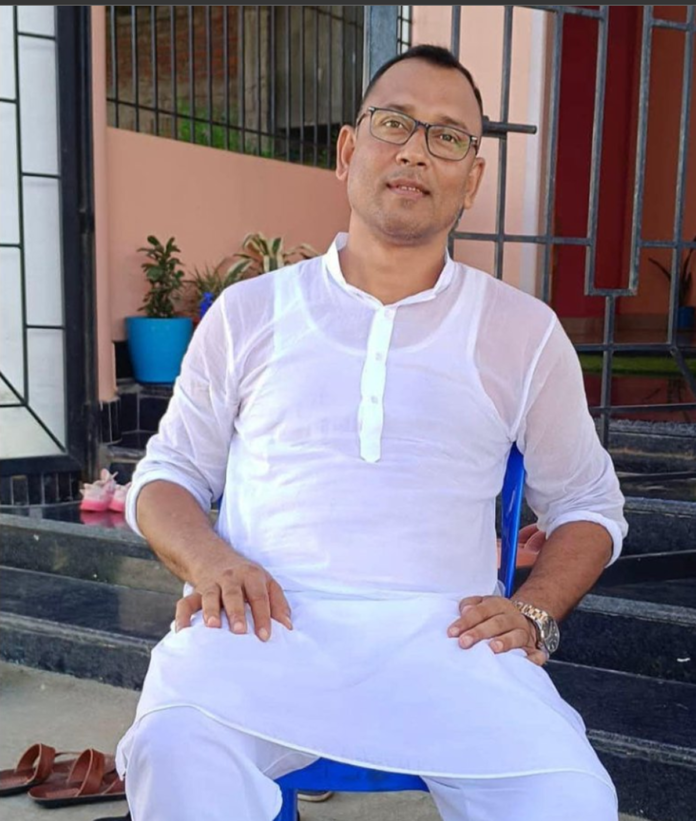Sandipan Talukdar, TwoCircles.net
Guwahati: “The tear gas shells suddenly fell before us like a bolt from the blue while we were about to take bytes from Assam Congress President Bhupen Borah. There was no warning or intimidation from the police. It was all of a sudden, and several journalists got injured,” said Jayanta Deka, a Guwahati-based independent journalist while recounting the chaotic scene outside Raj Bhavan on December 18.
That day, the Assam Pradesh Congress Committee (APCC) had organised a protest march, ‘Raj Bhavan Chalo’, which quickly turned deadly. The police action resulted in the death of Congress leader Mridul Islam, who was struck by a tear gas shell. Despite being rushed to GMCH (Gauhati Medical College and Hospital), Islam passed away en route.
Part of a nationwide Congress campaign, the protest demanded a high-level inquiry into the Adani controversy, restoration of peace in Manipur and the withdrawal of smart meters.
‘A Sudden Turn of Events’
Deka, who was at the scene, described the sudden escalation, “The Congress leaders and workers gathered a little distance from the Raj Bhavan Governor’s House), and after Bhupen Borah’s speech, the march began. Borah was stopped by the police at the barricades. As we surrounded him to take his bytes, a tear gas shell was launched.”
Deka recalled that Borah and Islam were both close to the barricade when the shell hit. “Islam was near Borah. He was chanting slogans. We saw him falling instantly as the shell hit him. He was rushed to the hospital, but we later learned he had died.”
The protest site was only about 6 kilometers from the Gauhati Medical College and Hospital (GMCH), a short distance that makes Islam’s death even more tragic – considering the speed with which he succumbed. Deka mentioned that three tear gas shells were fired during the incident.

Controversy Over Police Actions
Guwahati Commissioner of Police Diganta Barah claimed that the Congress had not obtained permission for the protest and crossed two barricades before being stopped at the third, where tear gas was used to disperse the crowd. He insisted there was no use of force. “We did not fire tear gas but rolled the canisters on the ground. Some protesters threw them back at us.”
However, the Congress quickly produced a letter from the Assam Pradesh Congress Committee (APCC) to the commissioner that confirms prior notice of the protest. Bearing a stamp from the commissioner’s office, the letter raised questions about whether Barah had been misinformed or intentionally misled the media.
A video released by The Crosscurrent contradicts the commissioner’s version. It shows a policeman firing a tear gas shell towards the crowd. Further doubts about the police’s actions emerged when Barah addressed Islam’s death. He stated that there were no visible injuries on his body and claimed that the cause of death would be determined by a post-mortem.

A Shocking Loss
Mridul Islam, a youth leader and a member of Congress’s Legal Cell, was known for his activism and was a practicing lawyer. His death has left his family and colleagues in shock. “He came from a humble background and was a dedicated Congress worker. His death is a direct attack on democracy,” said Mohsin Khan, a spokesperson of the APCC.
Thousands turned out for Islam’s funeral on December 19, including prominent figures like Bhupen Borah, Debabrata Saikia and Nandita Das, who all paid their respects.
Journalists Condemn Police ‘Brutality’
Journalists across Assam have protested the police’s actions, which they view as an assault on press freedom. At the Guwahati Press Club (GPC), members wore black badges and staged a protest march. Similar protests were organised in Jorhat and Silchar.
Amarendra Deka, a senior journalist from Pratidin Time, shared his experience of being injured by tear gas during the protest. “In my entire career, even while reporting from conflict zones, I have never seen such a situation. The police targeted journalists while we were trying to take comments from the leaders. This is a blatant attack on press freedom.”
He too expressed that it felt as though the police were deliberately keeping journalists away from speaking with the leaders. “It seemed like an attempt to block us from recording the protestors’ comments,” he said.

Civil Society Questions Police Actions
Paresh Malakar, a civil rights advocate, raised serious concerns on the police conduct. “Did the police follow the standard operating procedures? Tear gas has never killed anyone before. This needs a full investigation.”
He also questioned whether the incident reflected a broader trend of police brutality. “Are we a civilised society or are we under a police state?” he asked.
Congress to Compensate Islam’s Family
Congress leaders pledged financial and educational support to the deceased family. “We will provide Rs 25 lakh to the family, and if his wife wants to contest elections, we will support her,” said MLA Rekibuddin Ahmed.
Assam Chief Minister Himanta Biswa Sarma, on the other hand, announced a police inquiry into the incident, although he appeared to place blame on the Congress for breaching the barricades. “No demonstrations will be allowed near Raj Bhavan in the future,” he wrote on X.
The death of Mridul Islam and the injuries to journalists have sparked nationwide debates on police brutality, press freedom and the right to protest, with many calling for a thorough investigation and accountability.


